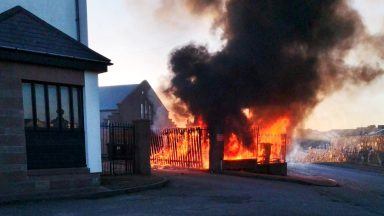An investigation is under way after an explosive misfired in a well at a North Sea oil and gas field.
A controlled explosive, used to stimulate well activity and create bores for access to the gas and oil, was prematurely activated at the Seagull Field, located around 143 miles off the coast of Aberdeen, on March 15.
The Health and Safety Executive was notified of the incident at the four-well development operated by both Ithaca and BP.
Production from the first well, J1, began in November 2023. Two further wells, J2 and J3, are also now onstream. A fourth well, J4, is due to start production in the second half of 2025.
The misfiring occurred at the J4 well, whilst under the operatorship of Ithaca.
Five perforating runs, the process of creating a path between the wellbore and the reservoir by blasting holes through the casing and cement, were made successfully.
But on the sixth run, the perforating firing head assembly activated prematurely.
A coiled tubing perforating system misfire can range in severity, causing minor operational delays to potential well control issues.
In this case, no injuries were reported and there was no environmental damage caused due to a well leak. It has since been restored to a safe condition.
A blowout preventer, which is a valve used to stop uncontrolled releases of crude oil or natural gas, was not triggered following the incident.
A Health and Safety Executive (HSE) spokesperson said: “Following an incident on March 15 this year, enforcement action has been taken and the investigation into what happened continues.
“Learnings from the investigation will be shared with industry following its conclusion.”
Enforcement notices issued to three companies
Three companies have been issued with enforcement notices following the misfiring of the explosive at the Seagull Field.
Ithaca, which is a 50% shareholder at the site, was deemed to have “failed to provide sufficient supervision”.
It was also noted that there was not more than one location on the rig monitoring the relevant pressures.
Ithaca did not ensure that the pressure was gradually increased, allowing a differential to develop, resulting in the misfire.
Pressure differentials can have serious implications for an oil rig. They can potentially lead to equipment damage, lost pipes, or even blowouts that result in fatalities.
Ithaca was deemed to have made three breaches including ensuring the safety of all those employed. The company has complied with the improvement notice which was closed on July 31.
A spokesperson said: “Ithaca Energy can confirm that we received an Improvement Notice from the HSE relating to an unplanned event that occurred in March 2025 on our Seagull J4 well.
“No injuries or environmental impact occurred as a result of the event, and normal operations have resumed. Ithaca Energy is committed to safe and responsible operations and accordingly have promptly executed measures to prevent any recurrence which has seen the Notice fully closed out by the HSE.”
The HSE has also issued a notice to Baker Hughes, which provides several services for drilling and completing the subsea wells at the site.
The watchdog concluded that the company failed to “ensure that appropriate instructions were given to the coiled tubing operators and pump operators”.
This resulted in the pressure differential not being detected. Baker Hughes was in breach of three regulations, including not having the appropriate health and safety arrangements in place.
Baker Hughes has been contacted for comment.
Oilfield services company Schlumberger was also issued with three enforcement notices following the incident
The company provides perforating services at the Seagull Oil and Gas Field.
The HSE found that Schlumberger “did not provide adequate procedures or processes to control” the mechanism used to detonate downhole explosive devices.
This was deemed to have resulted in the premature detonation of the perforating system.
Schlumberger also did not “adequately assess the risk of premature detonation” prior to the operation carried out at the Seagull field.
The improvement notices have been complied with.
Schlumberger has been contacted for comment.
BP was not issued with an improvement notice by the HSE.
Follow STV News on WhatsApp
Scan the QR code on your mobile device for all the latest news from around the country


 Ithaca
Ithaca





















